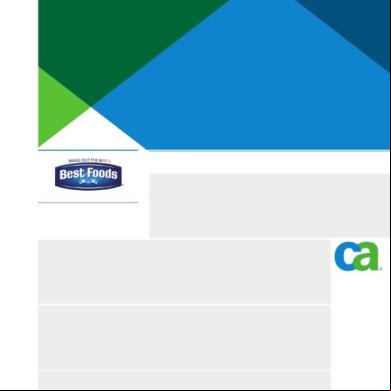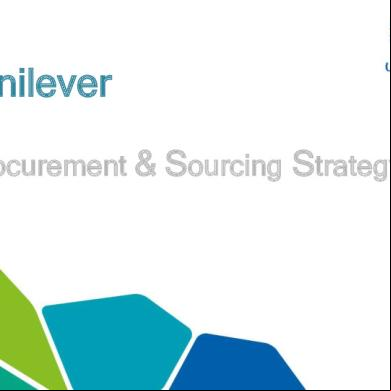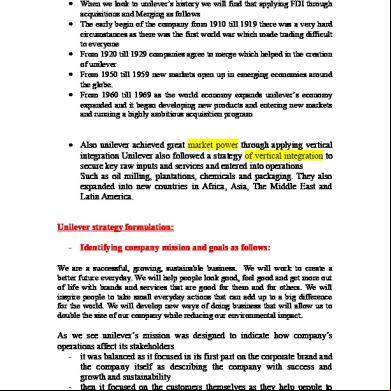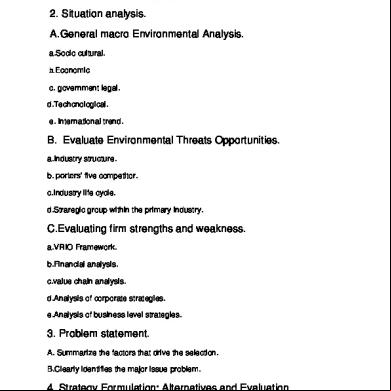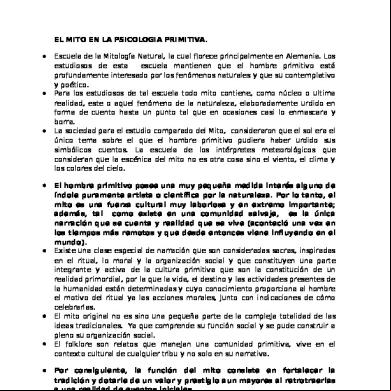Unilever 4x5n3a
This document was ed by and they confirmed that they have the permission to share it. If you are author or own the copyright of this book, please report to us by using this report form. Report 2z6p3t
Overview 5o1f4z
& View Unilever as PDF for free.
More details 6z3438
- Words: 963
- Pages: 10
CUSTOMER SUCCESS STORY: UNILEVER BESTFOODS NORTH AMERICA
Business: Domestos, Lux, Knorr, Hellmann’s, and Flora are just some of the 400 home, personal care and food products manufactured by Unilever. In North America, the company, which operates in 100 countries around the globe, has two distinct divisions: Unilever Bestfoods and Unilever Home and Personal Care (HPC).
Unilever boosts supply chain efficiency and reduces operational cost while meeting customer demand in over 100 countries. Business Impact Summary Solution: The company’s databases underpin a number of core business processes — from procurement to sales and distribution. To optimize the databases used by its North American divisions, Unilever deployed a CA Database Management solution that simplifies routine istration tasks and minimizes downtime. Result: By increasing database performance and utilization, Unilever’s North American divisions have been able to reduce operating costs and improve efficiency — thereby helping to ensure supply chain continuity and quality manufacturing processes. Challenge: To meet customer demand — 150 million times a day, someone somewhere is choosing a Unilever product — the company must ensure a constant supply of its merchandise to retail outlets around the globe. In addition to ensuring efficient distribution, Unilever must also maintain excellent product quality standards. Customer Profile Industry: Manufacturing Company: Unilever BestFoods North America Revenue: More than €39 billion (global figures for Unilever) Employees: 206,000 (global figures for Unilever)
2
CUSTOMER SUCCESS STORY: UNILEVER BESTFOODS NORTH AMERICA
Business Helping people get more out of life With 400 brands spanning 14 categories of home, personal care and food products, Unilever touches people’s lives in many ways. Some of its most popular brands include Domestos, Lux, Knorr, Hellmann’s, Lipton and Flora.
Unilever is dedicated to helping people get more out of life through its products, and conducts extensive consumer research to ensure that its brands meet the changing tastes, lifestyles and expectations of its millions of customers around the world. The company operates in 100 countries; in the US and Canada, its business is coordinated via two North American divisions: Unilever Bestfoods and Unilever Home and Personal Care (HPC).
Challenge Maintaining a seamless supply chain and product quality With such a vast product portfolio, Unilever Bestfoods and Unilever HPC have a highly complex supply chain and production line. As well as ensuring that it can meet the strong demand for its merchandise — 150 million times a day, someone somewhere is choosing a Unilever product — the divisions also need to maintain excellent quality standards. One of Unilever’s core goals is to provide people with food they can trust — and this means ensuring the highest levels of control throughout the sourcing, manufacturing and distribution of its products. To manage day-to-day activities, the two North American divisions depend on an extensive enterprise resource planning (ERP) system, which is ed by a number of extremely large databases. The ERP system s a range of core business processes, such as sales, distribution, procurement and finance. As a result, both the SAP ERP applications and Oracle databases must be both highly available and scalable to cope with the company’s activities. Unilever Bestfoods uses approximately 500 gigabytes of disk space in its production environment, while the HPC division uses another 150 gigabytes. Both divisions also keep up to seven copies of this data for development and testing. This means Unilever’s database s are locked in a constant balancing act to ensure the optimum performance of the ERP applications, while at the same time control the growth of the company’s databases. As Cathy Doyle, Manager of IT for Unilever Bestfoods, explains, “Reducing database fragmentation is a key concern for us, both in of performance and disk space usage. Equally important is the speed at which we can perform database maintenance to ensure business operations are not disrupted.”
“Reducing database fragmentation is a key concern for us, both in of performance and disk space usage.” Cathy Doyle Manager of IT, Unilever Bestfoods
Solution Getting to grips with data To help increase the efficiency of data management across the business, Unilever deployed a CA Database Management solution to enable it to dramatically simplify routine istration tasks as well as increase application availability. The solution, which is based on the CA TSreorg and Fast Unload products, achieves these results by enabling Unilever to extract and organize information in its databases quickly and reliably. In particular, Unilever has been impressed with the solution’s failure prediction feature. As Sharon Peterson, Lead Database for Unilever Bestfoods, explains, “Running out of disk space in the middle of a reorg can double the amount of time the process takes. With CA’s Database Management solution, this is no longer a worry, which means we are able to reduce database downtime.” The solution minimizes downtime by enabling database s to unload and reorganize data while mission-critical applications remain online.
Results Achieving maximum performance with minimum downtime In a mission-critical IT environment like Unilever’s, Doyle and Peterson’s teams must squeeze every ounce of performance from their databases, while also conserving disk space. This is a tall order, but with the CA Database Management solution, the Unilever s are able to achieve just this — and with minimal impact on end-s.
By optimizing its database performance and utilization, Unilever’s North American divisions have been able to:
•
Improve operational efficiency
•
Ensure the continuity of supply chain and manufacturing processes
•
Reduce operating costs.
These financial savings have primarily been made through the reclamation of massive amounts of disk space. For example, when Unilever Bestfoods implemented a new ERP application, it consumed a large amount of disk space. However, with the CA Database Management solution, Unilever was able to recover almost 500 gigabytes of disk space — eliminating the need to spend money on more hardware and increasing the performance of the new application.
Business: Domestos, Lux, Knorr, Hellmann’s, and Flora are just some of the 400 home, personal care and food products manufactured by Unilever. In North America, the company, which operates in 100 countries around the globe, has two distinct divisions: Unilever Bestfoods and Unilever Home and Personal Care (HPC).
Unilever boosts supply chain efficiency and reduces operational cost while meeting customer demand in over 100 countries. Business Impact Summary Solution: The company’s databases underpin a number of core business processes — from procurement to sales and distribution. To optimize the databases used by its North American divisions, Unilever deployed a CA Database Management solution that simplifies routine istration tasks and minimizes downtime. Result: By increasing database performance and utilization, Unilever’s North American divisions have been able to reduce operating costs and improve efficiency — thereby helping to ensure supply chain continuity and quality manufacturing processes. Challenge: To meet customer demand — 150 million times a day, someone somewhere is choosing a Unilever product — the company must ensure a constant supply of its merchandise to retail outlets around the globe. In addition to ensuring efficient distribution, Unilever must also maintain excellent product quality standards. Customer Profile Industry: Manufacturing Company: Unilever BestFoods North America Revenue: More than €39 billion (global figures for Unilever) Employees: 206,000 (global figures for Unilever)
2
CUSTOMER SUCCESS STORY: UNILEVER BESTFOODS NORTH AMERICA
Business Helping people get more out of life With 400 brands spanning 14 categories of home, personal care and food products, Unilever touches people’s lives in many ways. Some of its most popular brands include Domestos, Lux, Knorr, Hellmann’s, Lipton and Flora.
Unilever is dedicated to helping people get more out of life through its products, and conducts extensive consumer research to ensure that its brands meet the changing tastes, lifestyles and expectations of its millions of customers around the world. The company operates in 100 countries; in the US and Canada, its business is coordinated via two North American divisions: Unilever Bestfoods and Unilever Home and Personal Care (HPC).
Challenge Maintaining a seamless supply chain and product quality With such a vast product portfolio, Unilever Bestfoods and Unilever HPC have a highly complex supply chain and production line. As well as ensuring that it can meet the strong demand for its merchandise — 150 million times a day, someone somewhere is choosing a Unilever product — the divisions also need to maintain excellent quality standards. One of Unilever’s core goals is to provide people with food they can trust — and this means ensuring the highest levels of control throughout the sourcing, manufacturing and distribution of its products. To manage day-to-day activities, the two North American divisions depend on an extensive enterprise resource planning (ERP) system, which is ed by a number of extremely large databases. The ERP system s a range of core business processes, such as sales, distribution, procurement and finance. As a result, both the SAP ERP applications and Oracle databases must be both highly available and scalable to cope with the company’s activities. Unilever Bestfoods uses approximately 500 gigabytes of disk space in its production environment, while the HPC division uses another 150 gigabytes. Both divisions also keep up to seven copies of this data for development and testing. This means Unilever’s database s are locked in a constant balancing act to ensure the optimum performance of the ERP applications, while at the same time control the growth of the company’s databases. As Cathy Doyle, Manager of IT for Unilever Bestfoods, explains, “Reducing database fragmentation is a key concern for us, both in of performance and disk space usage. Equally important is the speed at which we can perform database maintenance to ensure business operations are not disrupted.”
“Reducing database fragmentation is a key concern for us, both in of performance and disk space usage.” Cathy Doyle Manager of IT, Unilever Bestfoods
Solution Getting to grips with data To help increase the efficiency of data management across the business, Unilever deployed a CA Database Management solution to enable it to dramatically simplify routine istration tasks as well as increase application availability. The solution, which is based on the CA TSreorg and Fast Unload products, achieves these results by enabling Unilever to extract and organize information in its databases quickly and reliably. In particular, Unilever has been impressed with the solution’s failure prediction feature. As Sharon Peterson, Lead Database for Unilever Bestfoods, explains, “Running out of disk space in the middle of a reorg can double the amount of time the process takes. With CA’s Database Management solution, this is no longer a worry, which means we are able to reduce database downtime.” The solution minimizes downtime by enabling database s to unload and reorganize data while mission-critical applications remain online.
Results Achieving maximum performance with minimum downtime In a mission-critical IT environment like Unilever’s, Doyle and Peterson’s teams must squeeze every ounce of performance from their databases, while also conserving disk space. This is a tall order, but with the CA Database Management solution, the Unilever s are able to achieve just this — and with minimal impact on end-s.
By optimizing its database performance and utilization, Unilever’s North American divisions have been able to:
•
Improve operational efficiency
•
Ensure the continuity of supply chain and manufacturing processes
•
Reduce operating costs.
These financial savings have primarily been made through the reclamation of massive amounts of disk space. For example, when Unilever Bestfoods implemented a new ERP application, it consumed a large amount of disk space. However, with the CA Database Management solution, Unilever was able to recover almost 500 gigabytes of disk space — eliminating the need to spend money on more hardware and increasing the performance of the new application.
